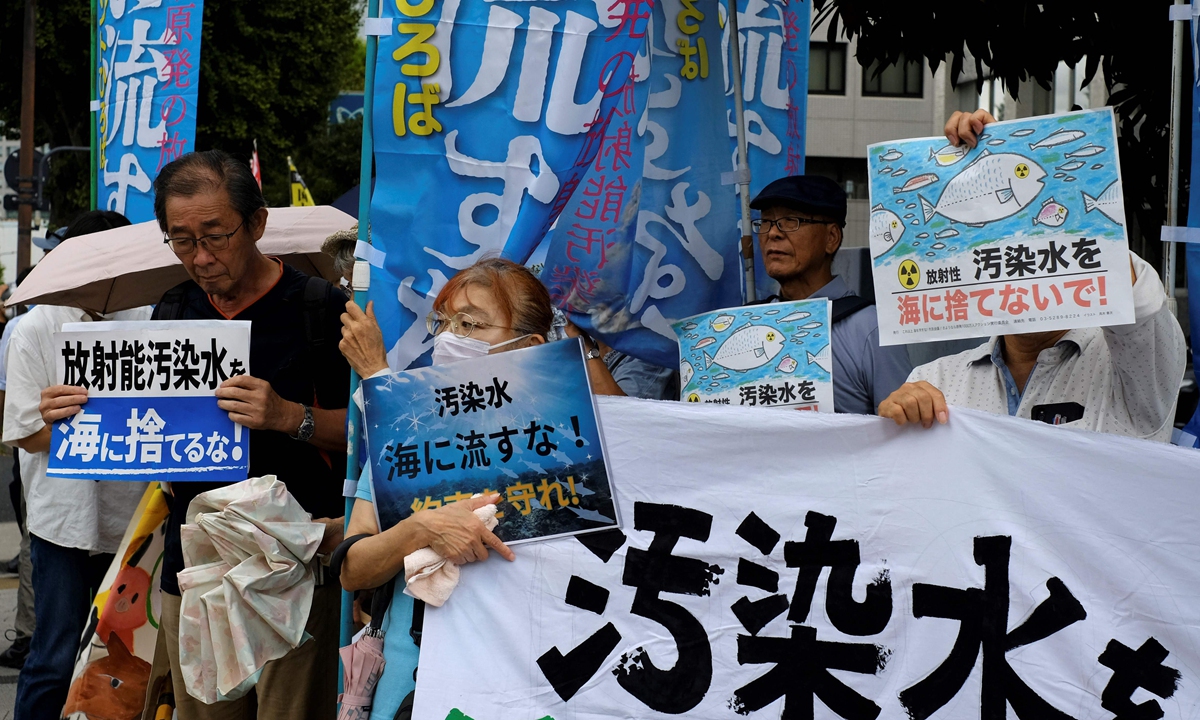
Japanese protesters hold signs reading "Don't throw radioactive contaminated water into the sea!" and "Don't throw polluted water into the sea," as they take part in a rally against the Japanese government's plan to dump contaminated wastewater from the crippled Fukushima Daiichi power plant into the ocean, outside the prime minister's office in Tokyo on August 22, 2023. Photo: VCG
More citizen groups worldwide, including those in Japan, South Korea and China's Hong Kong Special Administrative Region, have taken to the streets in recent days to urge the Japanese government to stop its toxic move of dumping nuclear-contaminated wastewater into the ocean as Japan began a second round of dumping on Thursday.
The far-sighted activists stressed their determination to fight against the discharge till the end. At the same time, experts warned that this latest irresponsible move will not only further damage Japan's international reputation, but also continue to eat away at Japan's exports to China and discourage travel to Japan.
During the first round, which concluded on September 11, a total of 7,788 tons of contaminated water, stored in 10 tanks within the plant's premises, were released, according to the Japan Times on Thursday. In the second round, roughly the same amount of wastewater is set to be released over 17 days.
Plant operator Tokyo Electric Power Company Holdings (TEPCO) said it had finished inspections following the initial release and found no reason to alter procedures.
Meanwhile, the second round of dumping immediately faced a backlash among the public.
The Global Times learned on Friday that a Hong Kong federation lodged a petition at the Consulate-General of Japan in Hong Kong, strongly condemning Japan for its forced dumping of nuclear-contaminated water, and slamming Japan for ignoring the dissatisfaction of neighboring countries and regions, and demanding that Japanese Prime Minister Fumio Kishida to step down.
The group said that Japan's actions have greatly affected many shops in Hong Kong that do Japan-related business and Japan itself has been badly affected as well.
China's seafood imports from Japan in August dived 67.6 percent from a year earlier to 149.02 million yuan ($20.44 million), after a fall of 28.5 percent in July, Kyodo News reported, citing data from Chinese customs released in September. Japan's seafood exports to South Korea also plunged in August, according to reports.
The Japanese Consulate General in Hong Kong did not send staff to receive the petition letter, so the Hong Kong protesters posted the letter at the door and dispersed peacefully, hkcd.com reported on Friday.
Also on Thursday, a total of 99 civic, labor and environmental organizations held a rally in front of the Japanese Embassy in Seoul, South Korea, calling for the Japanese government to stop the second round of dumping. They also called on the South Korean government to file a lawsuit with the International Tribunal for the law of the sea.
On Wednesday, a number of Japanese civic groups gathered in the rain near the headquarters of TEPCO to oppose the second discharge, a local participant told the Global Times.
Participants held banners reading "Don't dump contaminated water into the sea" and shouted "The sea is not a dumping ground for nuclear waste" and "the discharge violates the [1972] London Convention" to express their firm opposition toward the release.
According to media reports, rally organizer Makoto Yanagida said on site that the Fukushima nuclear-contaminated water was directly in contact with the melted nuclear reactor core during the nuclear accident, and there is no international precedent for such a discharge into the sea. The dumping has left Japan with an extremely irresponsible image in the international community, Yanagida noted.
On Thursday,
a spokesperson from the Chinese Ministry of Foreign Affairs urged the Japanese government to comprehensively respond to the concerns of the international community and engage in full consultations with neighboring countries in a sincere manner, and responsibly handle the disposal of nuclear-contaminated water. The international community should promote the establishment of a long-term and effective international monitoring arrangement and ensure the active participation of relevant parties, including Japan's neighboring countries, said the spokesperson.




